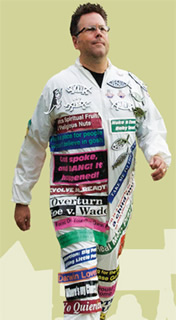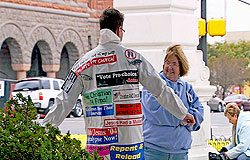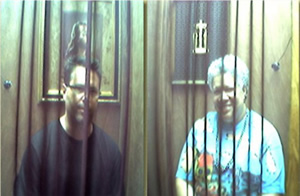Back to the Basics:
Love One Another
For Sunday May 2, 2010
Lectionary Readings (Revised Common Lectionary, Year C)
Acts 11:1–18
Psalm 148
Revelation 21:1–6
John 13:31–35
Last month I watched a documentary film that a friend recommended called Lord, Save Us From Your Followers. Its powerful message made me squirm in my seat. The writer-director Dan Merchant, an evangelical believer in the best sense of that word, dons a jump suit plastered with religious cliches and then hits the road as Bumper Sticker Man to interview people about one, single question.
Why has the gospel of love become the inflection point of so much bitter controversy?
 |
Dan Merchant. |
Merchant's movie reminded me of the book by David Kinnaman and Gabe Lyons called UnChristian; What a New Generation Really Thinks About Christianity (2007). Kinnaman's three-year social scientific survey by the Barna Group documents how an overwhelming percentage of sixteen to twenty-nine year olds view Christians with hostility, resentment and disdain.
These broadly and deeply negative views of Christians aren't just superficial stereotypes with no basis in reality, says Kinnaman. Nor are the critics people who've had no contact with churches or Christians. It would be a tragic mistake, he argues, for believers to protest that outsider outrage at Christians is a misperception. Rather, it's based upon their real experiences with today's Christians. In addition to their statistical research, the book includes anecdotes from people who were interviewed.
According to Kinnaman's study, here are the percentages of people outside the church who think that the following words describe present-day Christianity:
* antihomosexual 91%
* judgmental 87%
* hypocritical 85%
* old-fashioned 78%
* too political 75%
* out of touch with reality 72%
* insensitive to others 70%
* boring 68%
It would be hard to overestimate, says Kinnaman, "how firmly people reject — and feel rejected by — Christians" (19). Or think about it this way, he suggests: "When you introduce yourself as a Christian to a friend, neighbor, or business associate who is an outsider, you might as well have it tattooed on your arm: antihomosexual, gay-hater, homophobic. I doubt you think of yourself in these terms, but that's what outsiders think of you" (93).
Gabe Lyons of the Fermi Project who commissioned the Barna research remembers his first look at the data. "I'll never forget sitting in Starbucks, poring through the research results on my laptop. As I soaked it in, I glanced at the people around me and was overwhelmed with the thought that this is what they think of me. It was a sobering thought to know that if I had stood up and announced myself as a 'Christian' to the customers assembled in Starbucks that day, they would have associated me with every one of the negative perceptions described in this book" (222, his italics).
 |
Street interview. |
"A new command I give to you. Love one another," says Jesus in this week's gospel. "As I have loved you, so you must love one another. All people will know that you are my disciples if you love one another." It's not obvious in what sense this is a "new commandment"; it's an ancient commandment that goes back 3000 years to the founding of the Hebrew community: "Love your neighbor as yourself"" (Leviticus 19:18).
Merchant, Kinnaman and Lyons are hardly the first Christians to be agitated by this question. Way back in the fourth century the hermit Xanthias admitted that "a dog is better than I am, for he has love and does not judge." And Saint Maximos the Confessor (580–662) longed to experience the command of Jesus: "Blessed is the person who can love all people equally . . . always thinking good of everyone."
The necessary connection between claiming to love God and demonstrating that we love our fellow human beings was so embedded in the early Christian traditions that we find this teaching repeated almost verbatim by Paul (Romans 13:8–9, Galatians 5:14), by James (James 2:8), and most memorably by John: "If anyone says, 'I love God,' yet hates his brother, he is a liar. For anyone who does not love his brother, whom he has seen, cannot love God, whom he has not seen. And he has given us this command: Whoever loves God must also love his brother" (1 John 4:20–21).
"The only thing that matters," wrote Paul, "is faith expressing itself in love." You can summarize the entire Bible, he insisted, in five words: "Love your neighbor as yourself." To the Corinthians he wrote that the "greatest gift" is love, without which we are nothing but an irritation and a nuisance. And writing to the Romans, Paul urged the believers not to owe anyone anything, "except the continuing debt to love one another, for he who loves his neighbor has fulfilled the law" (Galatians 5:6, 14; Romans 13:8).
When God spoke to Peter in a vision to eat impure or unclean foods, he objected as a conscientious Jew, "Surely not, Lord! I have never eaten anything impure or unclean" (10:14). When he obeyed God anyhow and proceeded to meet with the Gentile named Cornelius, and observed the same grace of God in a person so otherwise different from himself, the Jewish believers criticized him: "You went into the house of uncircumcised men and ate with them" (11:3). The pressure to reject an "outsider" was so strong that even after learning his lesson in this week's text, Peter lapsed into hypocrisy on the matter and so Paul publicly rebuked him (Galatians 2:12).
 |
Merchant's confession booth. |
God, Peter learned, was not a God of partiality or favoritism. He warmly welcomes every person from any nation. The good news that was "sent to the people of Israel," said Peter, was that the grace of God was clearly given "even to the Gentiles" (10:34, 36, 45). If the God of all creation did not consider Cornelius and the Gentiles impure or unclean, then Peter realized that neither could he. What eventually transpired among the earliest followers of Jesus, says Marcus Borg, was a "community shaped not by the ethos and politics of purity, but by the ethos and politics of compassion."
I've found it a humbling exercise to ask who are the people that I sanctimoniously spurn as impure, unclean, dirty, contaminated, and, in my mind, far from God. Who is my personal and contemporary version of Peter's Cornelius? Maybe Rudy Giuliani and his wife who between them have been married six times, greedy executives, lazy welfare recipients, Republicans who lied us into a catastrophic war? How have I distorted the self-sacrificing, egalitarian love of God into self-serving, exclusionary elitism? What boundaries do I wrongly build because of my fears or might I bravely shatter in the name of love?
One of the funniest moments in Merchant's film is when the city council of Saint Paul, Minnesota, bans the Easter Bunny from city hall because of its association with Easter. In the last part of the film, though, there's a very powerful scene in which Merchant sets up a "confession booth" at a Portland gay pride festival. Only this time he was the one confessing our horribly unChristian lack of love.
For further reflection:
* Cf. Tertullian (AD 155–220): "Our care for the derelict and our active love have become our distinctive sign before the enemy . . . See, they say, how they love one another and how ready they are to die for each other."
* Consider how the early believers subverted normal social hierarchies of wealth, ethnicity, religion, and gender in favor of a radical egalitarianism before God and with each other: "There is neither Jew nor Greek, slave nor free, male nor female, for you are all one in Christ Jesus" (Galatians 3:28).
* Abba Anthony said, "Our life and our death is with our neighbor. If we gain our neighbor, then we have gained God; but if we scandalize our neighbor, then we have sinned against Christ."
* Abba Apollo said, "When you see your neighbor, you have seen the Lord your God."
Image credits: (1) United Church of Christ News; (2) United Church News; and (3) www.Christian-movie.com.





